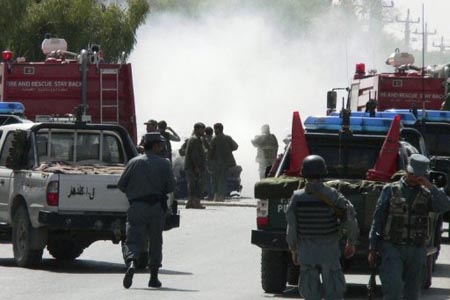AFP, July 12, 2010
Afghan monitor says 2010 worst year of war
But ARM said "little or no justification has been offered as to why a defeated Taliban is gaining strength, popularity and the ability to threaten the future of Afghanistan" nine years after being overthrown
By Lynne O'Donnell
This year has been the most violent since the Afghan war began in 2001 and civilian deaths have risen slightly with the increased insecurity, a local rights group said Monday.

About 1,074 civilians were killed and more than 1,500 injured in war-related incidents in the first six months of 2010, compared with 1,059 killed in the same period last year, ARM said. "Up to 1,200 security incidents were recorded in June, the highest number of incidents compared to any month since 2002," it said.
A massive US-led increase in troops has failed to quell the Taliban-led insurgency, Afghanistan Rights Monitor (ARM) said.
"In terms of insecurity, 2010 has been the worst year since the demise of the Taliban regime in late 2001," it said.
"Not only have the number of security incidents increased, the space and depth of the insurgency and counter-insurgency-related violence have maximised dramatically," ARM said.
In late December, US President Barack Obama ordered an extra 30,000 American troops into Afghanistan as part of a new counter-insurgency strategy designed to reverse the Taliban momentum and speed up an end to the nine-year war.
But ARM's mid-year report "Civilian Casualties of Conflict" said Obama's policy of intensifying operations against the Taliban has not disrupted, dismantled or defeated the insurgents.
On the contrary, it says, "the insurgency has become more resilient, multi-structured and deadly".
About 1,074 civilians were killed and more than 1,500 injured in war-related incidents in the first six months of 2010, compared with 1,059 killed in the same period last year, ARM said.
"Up to 1,200 security incidents were recorded in June, the highest number of incidents compared to any month since 2002," it said.
Military commanders had warned that boosted troops numbers would lead to more battles, and subsequently higher death tolls.
But ARM said "little or no justification has been offered as to why a defeated Taliban is gaining strength, popularity and the ability to threaten the future of Afghanistan" nine years after being overthrown.
In a breakdown of parties to blame for civilian deaths, ARM says 61 percent were caused by insurgents, 30 percent by US, NATO and Afghan forces, six percent by "criminals and private security firms", with three percent unknown.
The United States and NATO have more than 140,000 troops in Afghanistan with another 10,000 due in coming weeks as part of the counter-insurgency strategy.
The Taliban's main weapon, bombs known as improvised explosive devices (IEDs), were blamed for most of the Afghan civilian casualties, with suicide attacks the second biggest killer, ARM said.
It said a reduction in air strikes, ordered by the recently sacked commander of foreign forces, US General Stanley McChrystal, had resulted in fewer civilian deaths attributed to US-led forces.
Other country-insurgency measures introduced by McChrystal "were also deemed helpful", the report said.
Last week NATO apologised for the deaths of six civilians in a mistaken air strike and said that six Afghan soldiers died in a "friendly fire" incident.
Rules of engagement that aim to prevent civilian casualties have come under fire from some quarters, however, with the arrival of McChrystal's successor, US General David Petraeus, who took command on July 4.
Many soldiers complain they are hamstrung by the rules, attributing to them a spike in deaths and injuries. ISAF officials say the rules will not change.
So far this year, more than 350 foreign soldiers have died in the Afghan war, around 30 for July alone. The total last year was 520.
ARM's findings echo those of a UN report late last year that found most civilian casualties in 2009 -- up 11 percent in the first 10 months of the year over the same 2008 period -- were caused by Taliban attacks.
Characters Count: 4722
